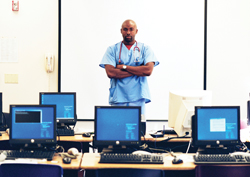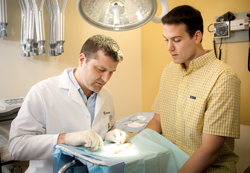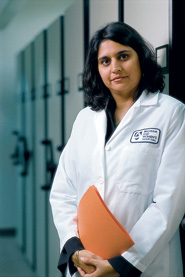Getting to quality and safety by ‘degrees'
Programs in quality and patient safety initiatives have come to the fore as graduate-level degrees, adding prestige to a new body of knowledge that has emerged in the past decade.
With the emergence of master's-level programs in quality and patient safety initiatives, physicians who want to bolster their expertise or their careers no longer have to limit themselves to seminars and online teleconferences.
“Our target audience is anyone in and out of health care who wants to make a difference,” said David Nash, FACP, MBA, dean of the Jefferson School of Population Health, based at Thomas Jefferson University in Philadelphia. “We have a bona fide science for clinical quality and safety that now is ready to be offered at the master's level. This was not true even five years ago.”

Some of the programs are offered online or are moving to that format, in part to attract a more far-flung mix of students. The degrees, which can be pursued part-time, frequently attract students with some tie to health care, although that might be in marketing or as a hospital administrator, as well as clinical fields. Frequently, students seek the degree to help achieve a management role, said David Mayer, MD, the curriculum director and one of the co-founders of the master's in patient safety leadership program at the University of Illinois at Chicago (UIC).
Physicians can benefit regardless of their specialty or practice setting, said Dr. Mayer, who also is co-executive director for the Institute for Patient Safety Excellence at UIC. “I think it truly makes them a better health care provider in regards to safety and how to reduce risk in their environment, be that an ambulatory environment or a hospital-based environment,” he said.
As a rule, today's medical training falls woefully short in preparing physicians to address patient safety challenges, according to a March report released by the National Patient Safety Foundation's Lucian Leape Institute. Besides understanding patient safety goals, physicians in training need to develop a host of related skills, including teamwork, better communication, problem analysis and application of human factors science, the authors wrote.
Ideally, these skills should be better taught in medical school, even if it means curtailing some of the time spent on core areas such as biochemistry, said Gregg Meyer, ACP Member, MSc, senior vice president for quality and safety at Massachusetts General Hospital and the Massachusetts General Physicians Organization in Boston. In the meantime, graduate training can start filling that gap, he said.
“I think the idea of having complementary programs at the master's level is a great way to get mid-career folks involved and maybe some end-of-career folks as well,” he said. “The generational issue is one I think a lot about. We don't want to wait for a generation.”
Delving into quality
Kevin O’Leary, ACP Member, MS, a hospitalist at Northwestern University in Chicago, signed up for the university's master's in health care quality and patient safety program with the goal of better handling the quality initiatives he was already leading. He quickly realized that he needed to boost not only his quality-related research skills, but also his leadership savvy.
“The deeper I got into it, the more I realized that I had to learn,” said Dr. O’Leary, associate chief of hospital medicine at Northwestern University's Feinberg School of Medicine.
Northwestern University's 18-month part-time program was launched in 2006. The Jefferson School of Population Health enrolled its first master's in health care quality and safety class in 2009; the program takes at least 24 months to complete at a part-time pace. The patient safety leadership program at UIC, which takes at least 18 months part-time, began in 2008.
UIC's patient safety program is only offered online. The other two programs are in the process of redesigning how they teach their classes, in part to attract a more geographically diverse pool of students. In response to requests, beginning this fall, Jefferson's master's program will be taught online only, according to Dr. Nash. “We do have physician interest globally,” he said. Northwestern University will continue to teach in the classroom but, beginning in 2011, will restructure its program so classes can be taken over a series of three-day weekends, allowing students to travel from outside Chicago.
The programs at all three schools typically wrap up with a final or capstone project. For his, Dr. O’Leary studied to what extent doctors and nurses communicate regarding an individual patient's treatment plan. His research, slated to be published this spring, found that the two groups experienced communication breakdowns. Patients' doctors and nurses didn't concur about the primary diagnosis slightly more than one-fourth of the time and didn't agree on medication changes 42% of the time. “I think it's mainly that each has part of the story and they are not sharing that part of the story with one another,” Dr. O’Leary said.
Following his study, Dr. O’Leary led the implementation of interdisciplinary rounds using a communication form, similar to a checklist, on two hospital units. As of March, the intervention had been expanded to all seven internal medicine units at Northwestern Memorial Hospital. Would he have assumed this project if he hadn't been part of the master's program? “I think I would have, but I know I would not have been able to do it as effectively,” he said.
Rapidly evolving
Students at all three schools complete a series of required courses and electives on such topics as introduction to health care quality, health informatics and economic analysis in health care. While the coursework among the programs has some overlap, UIC faculty members approach the quality equation through a somewhat different lens, according to Dr. Mayer. “While others have featured quality and quality improvement, we've focused a little heavier on safety and risk reduction strategies as they figure in the quality of health care that's provided,” he said.
To that end, students in the master's program can tap the expertise of not only the College of Medicine, but also the College of Engineering and other colleges at UIC, he said. One of the courses offered is on error science, risk and disclosure; another focuses on communication and collaboration. “We get into more things around human factors and processes and full disclosure and transparency, and leadership efforts around those,” he said.
Dr. Meyer, from Massachusetts General, is particularly intrigued that these programs are attracting not only clinicians, but also engineers, statisticians and other professionals who can bring a mix of perspectives to the quality table. “They think differently,” he said. After all, he said, medicine is learning a lot from aviation, nuclear energy and other fields.
To date, the UIC program has enrolled more than 50 students total, Dr. Mayer said, with the first class scheduled to graduate this year. Northwestern University has enrolled 51 students in its 18-month part-time program. By last year, a dozen had graduated.
Jefferson's quality program, which began with 10 students last fall, can expand to at least 60 students once the program is taught online, Dr. Nash said. He predicted that today's short list of graduate-level programs in health care quality and safety will also quickly grow.
“Based on the number of phone calls I get from potential programs around the nation, they are on my tail,” he quipped.




